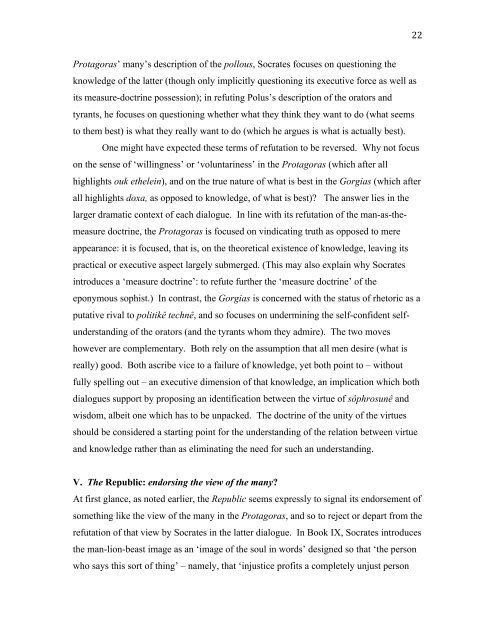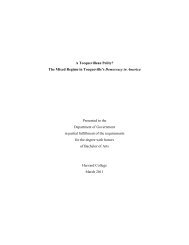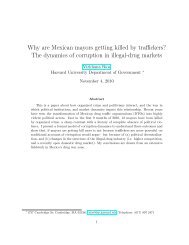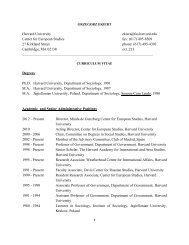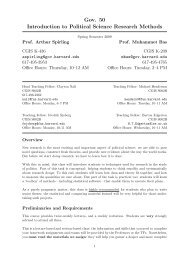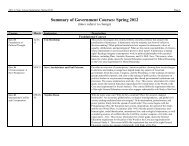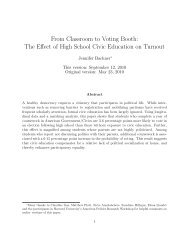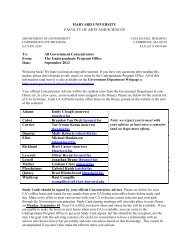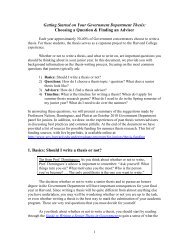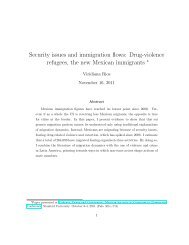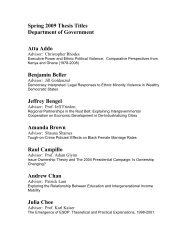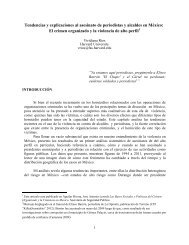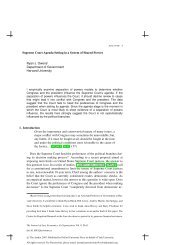1 Harvard University Political Theory Colloquium For 11 March 2010 ...
1 Harvard University Political Theory Colloquium For 11 March 2010 ...
1 Harvard University Political Theory Colloquium For 11 March 2010 ...
You also want an ePaper? Increase the reach of your titles
YUMPU automatically turns print PDFs into web optimized ePapers that Google loves.
22 <br />
Protagoras’ many’s description of the pollous, Socrates focuses on questioning the<br />
knowledge of the latter (though only implicitly questioning its executive force as well as<br />
its measure-doctrine possession); in refuting Polus’s description of the orators and<br />
tyrants, he focuses on questioning whether what they think they want to do (what seems<br />
to them best) is what they really want to do (which he argues is what is actually best).<br />
One might have expected these terms of refutation to be reversed. Why not focus<br />
on the sense of ‘willingness’ or ‘voluntariness’ in the Protagoras (which after all<br />
highlights ouk ethelein), and on the true nature of what is best in the Gorgias (which after<br />
all highlights doxa, as opposed to knowledge, of what is best)? The answer lies in the<br />
larger dramatic context of each dialogue. In line with its refutation of the man-as-themeasure<br />
doctrine, the Protagoras is focused on vindicating truth as opposed to mere<br />
appearance: it is focused, that is, on the theoretical existence of knowledge, leaving its<br />
practical or executive aspect largely submerged. (This may also explain why Socrates<br />
introduces a ‘measure doctrine’: to refute further the ‘measure doctrine’ of the<br />
eponymous sophist.) In contrast, the Gorgias is concerned with the status of rhetoric as a<br />
putative rival to politikê technê, and so focuses on undermining the self-confident selfunderstanding<br />
of the orators (and the tyrants whom they admire). The two moves<br />
however are complementary. Both rely on the assumption that all men desire (what is<br />
really) good. Both ascribe vice to a failure of knowledge, yet both point to – without<br />
fully spelling out – an executive dimension of that knowledge, an implication which both<br />
dialogues support by proposing an identification between the virtue of sôphrosunê and<br />
wisdom, albeit one which has to be unpacked. The doctrine of the unity of the virtues<br />
should be considered a starting point for the understanding of the relation between virtue<br />
and knowledge rather than as eliminating the need for such an understanding.<br />
V. The Republic: endorsing the view of the many?<br />
At first glance, as noted earlier, the Republic seems expressly to signal its endorsement of<br />
something like the view of the many in the Protagoras, and so to reject or depart from the<br />
refutation of that view by Socrates in the latter dialogue. In Book IX, Socrates introduces<br />
the man-lion-beast image as an ‘image of the soul in words’ designed so that ‘the person<br />
who says this sort of thing’ – namely, that ‘injustice profits a completely unjust person


